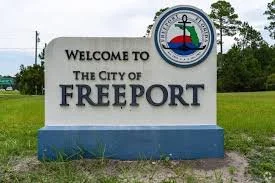Freeport, FL
Freeport is a historically significant port town in northern Walton County, Florida, nestled along the scenic Choctawhatchee Bay. First settled around 1830, its strategic location on the bay and near the mouth of the Choctawhatchee River made it a bustling commercial and political center for Walton County, with maritime trade and the timber industry driving its early economy. After losing its status as the county's economic powerhouse with the arrival of the railroad in nearby DeFuniak Springs, Freeport has since experienced a resurgence. Today, it is recognized as one of the fastest-growing cities in Florida, blending its historic small-town character with modern development and a strong connection to the natural environment.
Freeport's past as a transportation hub
Freeport's history dates back to the early 1830s, when settlers were drawn to its strategic location on Choctawhatchee Bay, near the mouth of the Choctawhatchee River. Originally known as Genoa and later Four Mile Landing, the town's key feature was its port. During the Civil War, it earned the name "Freeport" because there was no charge for ships to use the dock at the junction of Four Mile and Lafayette creeks. For many years, Freeport was the commercial and political hub of Walton County, serving as the main shipping point for goods coming from and going to Pensacola via steamboats and schooners. An overland stagecoach route from Tallahassee even connected with steamboat service near Freeport, solidifying its importance as a regional transportation center.
The power shift from Eucheeanna and Freeport to DeFuniak Springs
Freeport's dominance was directly challenged by the rise of DeFuniak Springs, a rivalry that began with the arrival of the railroad. Before the railroad, the county seat was located in the community of Eucheeanna, a Scottish Presbyterian settlement established in the 1820s. Eucheeanna was the administrative center of Walton County until 1885, when an arsonist burned its courthouse. The following year, with the Pensacola and Atlantic Railroad running nearby, a commission approved moving the county seat to the newly established DeFuniak Springs. The railroad's superior efficiency for overland transportation quickly eclipsed Freeport's maritime trade, causing a significant shift in the county's economic and political power. Many families from Freeport and Eucheeanna followed the economic engine, relocating to DeFuniak Springs, leading to Eucheeanna's decline and Freeport's loss of its regional powerhouse status.
Freeport's resilience and modern identity
Despite the economic challenges brought by the railroad, Freeport's long history has allowed it to adapt and thrive. For decades, its economy depended on the timber industry and naval stores, supported by its waterways. In the mid-20th century, the expansion of Eglin Air Force Base to its east brought a new influx of residents and economic opportunity. The construction of the Clyde B. Wells Bridge in 1946, connecting Freeport to South Walton and the coastal communities, further integrated the town into the county's economy. Today, while DeFuniak Springs remains the county seat, Freeport has transformed into a rapidly growing city. Its development has shifted from a historic shipping port to a modern hub connecting the county's northern and southern parts, attracting a diverse population while still honoring its "free port" history and heritage.
E.O. Wilson Biophilia Center
The E.O. Wilson Biophilia Center is a renowned environmental education facility located in Freeport, Florida, nestled within the heart of the 55,000-acre Nokuse Plantation. The center was founded in 2009 by the late conservationist M.C. Davis and named in honor of the famed biologist Edward O. Wilson, who popularized the term "biophilia," meaning "the love of all living things". The center's mission is to educate students and visitors on the importance of biodiversity, promote sustainability, and encourage the conservation and restoration of ecosystems. Its location within a massive, restored Longleaf Pine ecosystem—one of the most biodiverse areas in the U.S.—provides an immersive and unique learning environment.
The Biophilia Center serves as a vital educational resource for the Florida Panhandle. During the school year, it provides free, science-based environmental education programs for thousands of students from multiple counties, serving as an extension of the classroom with hands-on learning. In addition to its K-12 curriculum, the center offers public events, summer day camps, animal encounters featuring its wildlife ambassadors, and an extensive trail system for visitors to explore the natural surroundings. By connecting people, especially children, with nature, the Biophilia Center fulfills its founding purpose of fostering a deep love for the natural world, which its founder, M.C. Davis, believed was essential for its preservation.


